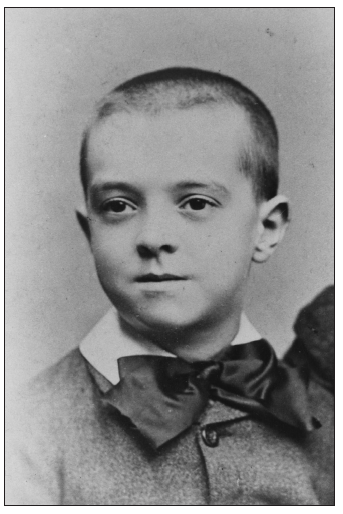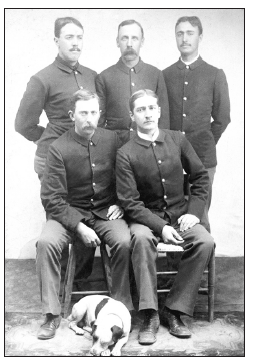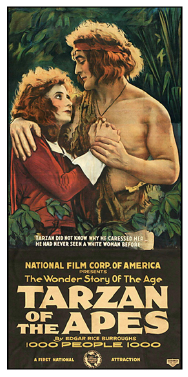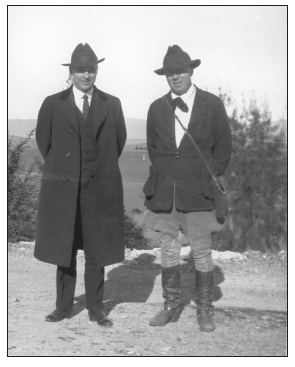Savage Lands (18 page)
Authors: Andy Briggs

“You'd have done the same for me,” said Jane with a smile.
Clark pretended to frown. “I think I did that already on a couple o' occasions.”
Tarzan stood and stepped toward the river. He watched in amazement as the water suddenly receded. It was choked upstream until nothing remained other than a wide strip of mud littered with decaying tree trunks, fragments of the gantry that had once been in the Opar mine, and hundreds of madly thrashing fish. Against the background of the raging volcano, it was an otherworldly image.
Jane shrieked as she was yanked off the rock and dragged backward into the bushes, clutching her throat. Everybody looked around in surprise, too stunned to react as Queen La stepped from the jungle holding one end of her whip, the other end wrapped tightly around Jane's neck. Her mouth hovered close to Jane's exposed throat, her remaining fangs threatening to puncture the skin.
Insanity danced in her eyes. Like the others, she was soaking wet, with gray ashes clinging to her pale skin. She was weak, her bejeweled robed was torn, burned, and dirtier than ever, but dozens of precious gems still clung to it. The others could only guess at the ordeal she'd just undertaken to escape from the collapsing cavern.
“You destroyed Queen La's kingdom!” she hissed accusingly. “You upset the Fire God and brought death to us all.”
Tarzan strode forward with a murderous expression on his face. Queen La hissed like a feral cat.
“Come closer and her throat will be torn!”
“Release her,” commanded Tarzan.
Queen La circled around Tarzan, ensuring the entire group was within view. She stood out in the emptied riverbed, which gave her the advantage of more space.
She stabbed a finger at Tarzan. “You brought this upon Opar! You angered the gods! So you will pay with your life!”
Robbie tensed, ready to use the last of his strength to charge Queen La. He felt Clark's hand on his shoulder, restraining him.
“You won't make it,” whispered Clark. “She'll have Jane's throat out in a flash.”
The stand off was bolstering Queen La's confidence and she leered at Tarzan. “Kneel before your queen.”
Tarzan flinched and remained motionless. Robbie hoped Tarzan didn't value his pride over Jane's life.
“Kneel!” hissed La with venom. “You killed the Targarni. You will replace them. Queen La will tame the beast.”
Tarzan was unmoved. “I am Tarzan. I am Lord of Jungle.” He thudded a fist across his chest. “And Tarzan kneels for no one.”
Queen La hissed, thin lips curling back across her jagged teeth as she drew Jane closer, angling her head to reveal more slender neck. Jane struggled, pulling away, but La was too strong.
Jane's move was a feint. As she yanked away, Queen La pulled her nearerâthen Jane suddenly threw all her weight in the direction she was being pulled, violently headbutting the mad queen. Queen La didn't expect the move and was thrown off balance, dropping the whip.
Jane dropped and rolled away as Tarzan pounced through the air before Queen La could move. They fell back into the mud. Tarzan grappled for the woman, but the slick mud made it easy for her to slip from his grasp. She punched Tarzan across the face, then held him back with one trembling arm. Such strength from the wiry woman should have been impossible, but she held her own with Tarzan as they traded blows.
Then a loud booming heralded new danger. Lava pouring down the flanks of the volcano had obliterated the jungle in its path and now appeared on the gorge ridge opposite the beach. The leading edge of the lava was already cooling, turning black as it solidified. But from behind, a wave of sizzling red rock subsumed it and poured over the edge of the gorge in a single quarter-mile-wide lava-fall. It splashed down onto the far side of the dry riverbed and crept inexorably closer.
“Tarzan!” shouted Jane. “Run!”
Queen La ignored the glowing wall of rock creeping up on them. She gnashed at Tarzan, tearing a bloody lump from his arm. Tarzan ignored the pain and, with a snarl, grabbed Queen La around the throat, his other hand around her leg as he hoisted her high above his head.
La thrashed and clawed his head, pulled his hair, and tried to poke out his eyes, but Tarzan shook her, even biting a clawed finger off when she just missed his eye. He walked resolutely toward the lava, then stumbled when a gunshot rang out and a bullet grazed his side. Tarzan almost dropped, but regained his balance, turning to see what new menace had presented itself.
It was Albert Werper. He was almost unrecognizable; half his face was burned red raw, and what hadn't been scorched by magma had been chewed by Goyad. His clothes hung like rags as he emerged from the jungle, Idra's rifle pushed against his shoulder and sighted on Tarzan. His breathing was heavily laboured and his voice hoarse and unrecognizable. “LET HER GO!” he croaked.
Greystoke took a step toward Werper, but stopped when the rifle barrel swung toward him, before settling back on Tarzan.
“Next person to move gets shot.”
“Albert ⦔ Greystoke stammered. “What happened ⦠? How did you ⦠?”
“Same way as you. After you abandoned me to die.” He spat. “Opar is destroyed and all its treasure hangs from that witch.”
“Don't be a fool, Werper!” snapped Clark. “If we don't leave now, we're all gonna die!”
“Shut up!”
“What use is money if you're dead?” said Clark.
“It's mine!” Werper shouted.
Tarzan ignored him and limped toward the wall of lava. Werper raised the gun and took aim.
“NO!” screamed Jane. But it was too late. Werper had pulled the trigger.
The shot rang out but missed its mark as Greystoke leaped in front of Tarzan, taking the shot to his chest. The impact was so severe that he was hurled several feet backward.
Werper blinked in surprise and pulled the trigger again. The rifle clicked on an empty barrel. With shaking hands he tried to reload, but Robbie and Clark foiled him.
⢠⢠â¢
T
arzan
was oblivious to his cousin's sacrifice. He limped as close to the lava as he dared and hoisted the screaming Queen La high. Her imminent death was just breaking through the madness that clouded her mind.
“No ⦠please ⦔ she whimpered, no longer the strong queen, but a terrified mortal. She met Tarzan's gaze, and for a second he hesitated, lowering her slightly. That was enough for Queen La. Her familiar mask of hatred suddenly replaced her terrified countenance as she lunged for him. Her jagged fangs bit his forehead to the bone.
Tarzan bellowed, “I am your lord!” And he hurled the writhing wretch into the lava with all his might. He didn't wait to see the macabre results of his handiwork, as the river of lava was quickly advancing.
He raced back to the others, stopping in confusion when he saw everybody surrounding Greystoke. The Englishman was unconscious and paling as he rapidly lost blood from his stomach wound. Tarzan looked impassively at the dying man.
“Werper tried to shoot you,” said Jane. She stroked Greystoke's forehead. “He took the bullet to save you.”
Tarzan had always relied on his initial judgment of people. He had been right about D'Arnot and Jane. People seldom changed, but he had to concede that Robbie had surprised him, so perhaps it was possible the man who claimed to be his family, who had struck Jane and even tried to kill him, could change too.
Tarzan turned his attention to Werper who was on his knees, arms pressed behind his head by Clark, who was warily watching the advancing lava.
“I don't know what we should do with him, but we can't just stand 'ere.”
Tarzan knelt at Greystoke's side and tore the Englishman's bloody shirt open. The bullet had gone through his stomach, shredding the bandages wrapped around his midriff. The bullet should have torn a gaping hole in his back as it exited, but there was no such sign. Tarzan noticed fragments of yellow gemstone across Greystoke's chest. He searched the man's waistcoat and found fragments of a yellow opal that had been hidden in his inside pocket. It would have been quite valuable if the bullet hadn't shattered it into a thousand pieces. The gemstone had saved his life, although Greystoke was unconscious and his internal injuries were no doubt life-threatening.
Tarzan stood and yanked Werper to his feet by his hair, pulling the man close so he could see the terror in his eyes. Then he pushed him away toward the trees.
“Go!” he growled.
Werper looked surprised to be given a reprieve, but he didn't waste the chance. He scrambled into the jungle as fast as he could.
“You're just gonna let him go?” said Robbie, equally surprised.
“Let the jungle claim him,” said Tarzan as he lifted Greystoke. “We leave now.”
Clark and Jane helped Ramón stand, and together they dashed into the jungle.
⢠⢠â¢
P
rogress
was much slower than they were used to, as everybody, including Tarzan, was exhausted and hurt. They kept to animal trails through the jungle, always conscious of the wall of lava slowly advancing behind them, threatening to consume them if they dared stop for too long. The volcano boomed several more times, but they could see nothing through the jungle's thick canopy.
At nightfall they stopped on a rocky outcrop that offered a view across the jungle. Lava still oozed from the volcano, glowing cherry red in the twilight, but it hadn't advanced beyond the riverbed. Taking the path of least resistance, the lava had moved downstream and left the jungle alone. Jane's nightmarish visions of the jungle ablaze had not come to pass.
The jubilation they felt for surviving was tempered by guilt over how many they had lost. Survivor's guilt, Clark had called itâand he seemed to be suffering just as much as the others.
Greystoke fell into a fever during the night, and Tarzan tended to his wounds the best he could before fatigue overtook them and they all slept soundly.
It was the end of the second day when they finally entered Orando's village. Jane was delighted to see Orando had made it safely home. He and Tarzan took Greystoke to the shaman. Robbie had wanted to watch, but they were forbidden to see the sacred rites performed as they attempted to pull Greystoke back from the brink of death, although everybody was fairly sure the Englishman would not make it through the night.
Ramón had recovered well and marveled when he was told that Reyna had been taken to safety by the gorillas.
“Incredible,” he breathed. “To film such a thingâ”
Jane held up her hand to cut him off. “There we have a problem. If either of you speak about this, if you tell the world of Opar, of Tarzan, they will beat a path here, and we don't want that.”
Ramón was feeling well enough that his journalistic training shone through. “The world needs to know such things.”
“No they don't. Some things are best kept secret.”
Ramón eventually nodded solemnly as he thought about the loss of life and the pointless drive for greed. He saw her point.
The next morning everybody was surprised to see Greystoke on his feet. He was weak, but alive, and couldn't stop smiling when he saw the others.
Clark patted him on the back and grinned. “Glad you're back on your feet.”
“I didn't know you cared,” Greystoke said, only half joking.
Clark shrugged. “Well, I thought being prisoners kinda bonded us together.” Greystoke nodded in agreement. “Besides, there's someone I want ya to meet. Lord Greystoke, this is your cousin, Tarzan.”
Tarzan was perplexed by the introduction. Greystoke just nodded and in a small voice said, “I know. Thank you, John.” Using Tarzan's real name meant nothing to the ape-man.
Clark was the one to break the awkward silence. “Well, I just delivered on an agreement, so I know someone who owes me a lot of money.”
Greystoke treated him to a bemused smile. Jane looked uneasily between Tarzan and his cousin.
“So, what now?”
The two Greystokes met each other's gaze, and silence descended across the village as the jungle held its breath.
Edgar Rice Burroughs
and Tarzan
F
rom the day he was born in Chicago, on September 1, 1875, until he submitted half of a novel to
All-Story Magazine
in 1911, Edgar Rice Burroughs failed in nearly every enterprise he tried.
He attended half a dozen public and private schools before he finally graduated in 1895 from Michigan Military Academy, an institution he described as “a polite reform school.”
Having failed the entrance examination for the United States Military Academy at West Point, he enlisted as a private in the Seventh US Cavalry because he thought he might still obtain a commission as an officer if he distinguished himself in a different assignment. He asked to be sent to the worst post in Americaâa request the authorities speedily granted.
The post was Fort Grant in the Arizona desert, and his mission, as he put it, was to “chase outlaw Apaches.” “I chased a good many Apaches,” he said, “but fortunately for me, I never caught up with any of them.”
Private Burroughs soon had his fill of Fort Grant, and after one year he was discharged. In 1900, he married Emma Centennia Hulbert, who dutifully followed him back and forth across America during the next eleven years.
He became a cowboy in Idaho, then a shopkeeper, a railroad policeman, a gold miner, and even an “expert accountant,” although he knew nothing of the profession. Throughout this period he somehow raised money for a number of his own businesses, all of which sank without a trace.
Life was dismal for the newly married couple. Burroughs became depressed; his wife, discouraged. Perhaps to escape from the grim reality of their lives, or perhaps to amuse Emma, he would often sketch darkly humorous cartoons or write fantastic fairy tales.
By 1911, Burroughs's position had become so desperate that not even his cartoons and stories could block out the frustrating fact of his successive failures. He even went so far as to apply for a commission in the Chinese army. (The application was summarily rejected.) He also applied for a post with Teddy Roosevelt's Rough Riders, but there were no vacancies.
Finally he reached rock bottom. He was thirty-five years old, without a job, without money. In addition to his wife and two children, a third child was expected soon. He could buy food and coal only by pawning his watch and Emma's jewelry.
While working as a manager for pencil-sharpener salesmen, he used his leisure moments while “waiting for them to come back to tell me that they had not sold any,” to begin writing
Under the Moons of Mars,
his first story. He recalled:
I had no idea how to submit a story or what I could expect in payment. Had I known anything about it at all, I would never have thought of submitting half a novel, but that is what I did. Thomas Newell Metcalf, then editor of
All-Story Magazine
â¦
wrote me that he liked the first half of the story and if the second was as good he thought he might use it. Had he not given me this encouragement, I would never have finished the story and my writing career would have been at an end, since I was not writing because of any urge to write nor for any particular love of writing. I was writing because I had a wife and two babies, a combination which does not work well without money.
I finished the second half of the story and got $400 for first magazine serial rights. The check was the first big event in my life. No amount of money today could possibly give me the thrill that this first $400 check gave me.
Today, scholars consider that story to be the turning point of twentieth-Âcentury science fiction. New editions continue to be published annually throughout the world.
But Burroughs was still a long way from becoming an established writer. His next literary effort, a historical novel set in the England of the Plantagenet kings, was rejected. He nearly gave up but his publisher would not hear of it. “Try again,” the publisher urged. “Stick with the âdamphool' stuff.”
Burroughs did, and with his next novel, his future was decided. The novel was
Tarzan of the Apes
. An astonishing success on its appearance in
All-Story Magazine
in 1912,
Tarzan of the Apes
brought Edgar Rice Burroughs $700 and a surge of success. Burroughs sent the manuscript to book publishers but was rejected by practically every major company in the country. Finally,
Tarzan
was printed as a novel from A.C. McClurg and Co., and it became a bestseller in 1914.
Said Burroughs, “In all these years I have not learned one single rule for writing fiction. I still write as I did thirty years ago; stories which I feel would entertain me and give me mental relaxation, knowing that there are millions of people just like me who will like the same things I like. Anyway, I have great fun with my imaginings, and I can appreciateâin a small wayâthe swell time God had in creating the universe.”
A torrent of novels followed
Tarzan:
stories about Mars, Venus, Apaches; Westerns; social commentaries; detective stories; tales of the Moon and of a fictional Hollow Earthâand more and more Tarzan books. By the time his pen was stilled, nearly one hundred stories bore Edgar Rice Burroughs's name.
In 1918, Tarzan debuted on screen in the silent film
Tarzan of the Apes
, starring Elmo Lincoln. It became one of the first films in history to earn one million dollars. Since then, fifty Tarzan live-action films, 115 one-hour television episodes, seventy-one half-hour animated television episodes, and three feature animation films have been produced, with more than twenty-seven actors playing the lead role.
Although he joked about the films, Burroughs was bitterly disappointed with the Tarzan motion pictures. Often he would not go to see them. His Tarzan was a supremely intelligent, sensitive man. His Tarzan sat in the House of Lords when not otherwise occupied in the upper terraces of the African jungle. His Tarzan was a truly civilized manâheroic, handsome, and above all, free.
In 1919, with financial security assured, Burroughs moved to California, where he purchased the 550-acre estate of General Harrison Gray Otis, renaming it “Tarzana Ranch.” By 1923, the city of Los Angeles had completely surrounded Tarzana Ranch, and Burroughs sold a large portion of it for home sites. In 1930, a post office was established, and the three hundred residents held a contest to find a name for the new community. The winning entry was “Tarzana.”
By the mid-1930s, daily and special Sunday Tarzan comic strips appeared in more than 250 newspapers all over the world. Tarzan radio serials thrilled millions of listeners across the country, with Burroughs's daughter, Joan, in the role of Jane, and her husband, James H. Pierceâwho had played the lead in the silent movie
Tarzan and the Lion Men
âas Tarzan.
Today, Tarzan television programs and films are shown on an array of different networks all over the world. A Tarzan movie plays somewhere in the world every day. And with the contemporary emphasis on outer space, Burroughs's science fiction writings are still treasured.
In 1942, Burroughs became America's oldest war correspondent, covering stories with the Pacific Fleet for United Press. He returned home from the South Pacific only after suffering a series of heart attacks. Ironically, he was unable to find a suitable home in Tarzana, and he spent his remaining years in a modest house in nearby Encino. It was there, on March 19, 1950, that he set down his pen for the final time.
The last line he ever wrote:
“Thank God for everything.”

Burroughs around age ten.

Edgar Rice Burroughs at age sixteen in Idaho.

Burroughs's friends and fellow soldiers, known as “the May-have-seen-better-days Club,” at Fort Grant, Arizona, in 1896.

Tarzan of the Apes
(1918), a silent film, was the first Tarzan movie ever made and one of the first movies to ever earn one million dollars. The success of the film allowed Burroughs to buy the ranch he named Tarzana.

In 1919, Burroughs purchased a ranch near Los Angeles with the money he earned from the first Tarzan movie, calling the property “Tarzana.” As the city spread around the ranch, Burroughs sold part of it for development, and in 1930, his neighbors voted to name their new town Tarzana.

In 1922, Burroughs's old friend, Robert D. Lay from the Michigan Military Academy, visited Burroughs's California ranch. Lay had become president of a large life insurance company.